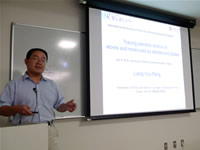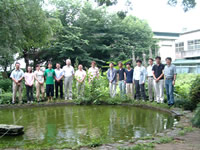

The International Workshop on Attosecond Quantum Dynamics Theory on the pioneering research task of Ultra-high Resolution 4-D Spatio-temporal Imaging using Intense Laser Pulses (represented by Toru Morishita of the University of Electro-Communications) was held at the University of Electro-Communications in Chofu, Tokyo from June 22 - July 16, 2010. This was an experiment in establishing international cooperation through a new style of organization in which 5 experts in related fields were invited from overseas to spend four weeks in residence, taking part in seminars with other participants and freely exchanging opinions, as well as developing actual theory, computational methods, and programs based on workshop activities.
In the first half, from June 30 - July 6, seminars were held by the five guest researchers, along with some degree candidates, and Kenichi Ishikawa, who works in the same groundbreaking research area of Evolution of light Generation and Manipulation. All included, nine individuals delivered lectures to as many as 70 participants. At the seminars various topics were introduced and vigorously discussed in terms of future potential, etc., including: adiabatic theory (a new theory related to analysis of atomic and molecular dynamics in a high-intensity laser field); quantum dynamics of many-electron systems; methods of analysis using the attosecond pulse; quantum interference in high-order harmonic generation; two-color laser field dynamics; and new computational methods for above-threshold ionization of molecules. In the second half of the workshop participants exchanged opinions regarding the content of the seminars. In addition, investigations into possibilities for experimental conditions, and development of actual theoretical techniques and programs, were carried out. Ten young researchers from the University of Electro-Communications participated in these continuous discussions and convened smaller seminars when appropriate, among other activities, making for spirited discussion and debates in a very lively atmosphere.
The workshop was able to organize an international research network spanning Asia, Japan, and Europe, as well as expand the circle of human resources that comprise the foundation of science and technology. This new experiment with the "international workshop in residence" elicited a large number of opinions such as, "I became aware of the extreme importance of progress based on discussions and sharing knowledge among researchers," and, "I would like to see this continue, rather than just be a one-time event," indicating the positive opinions of participants.
JST, an integrated organization of science and technology in Japan, establishes an infrastructure for the entire process from the creation of knowledge to the return to the society. For more information, visit http://www.jst.go.jp/EN/